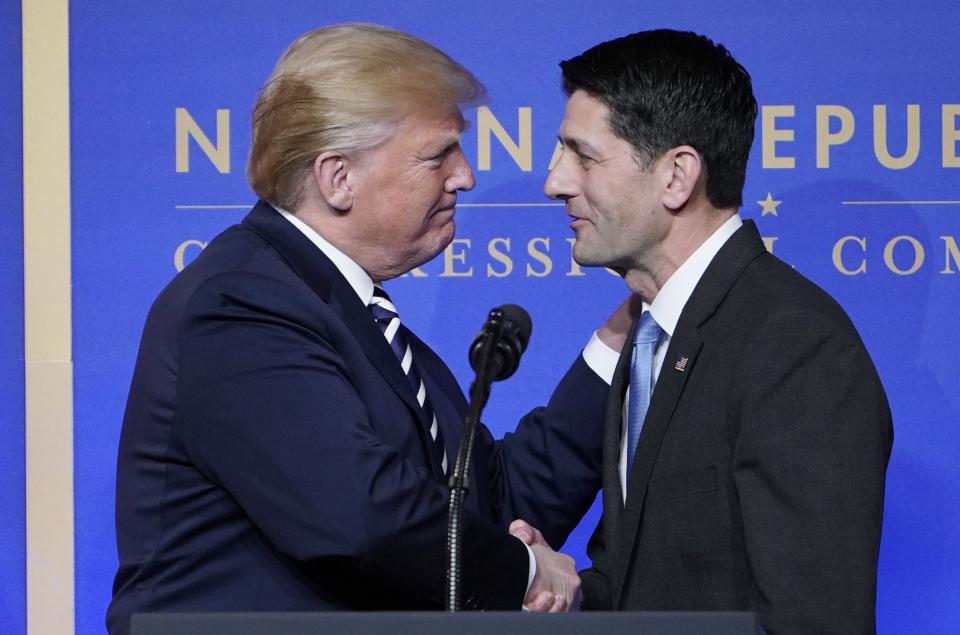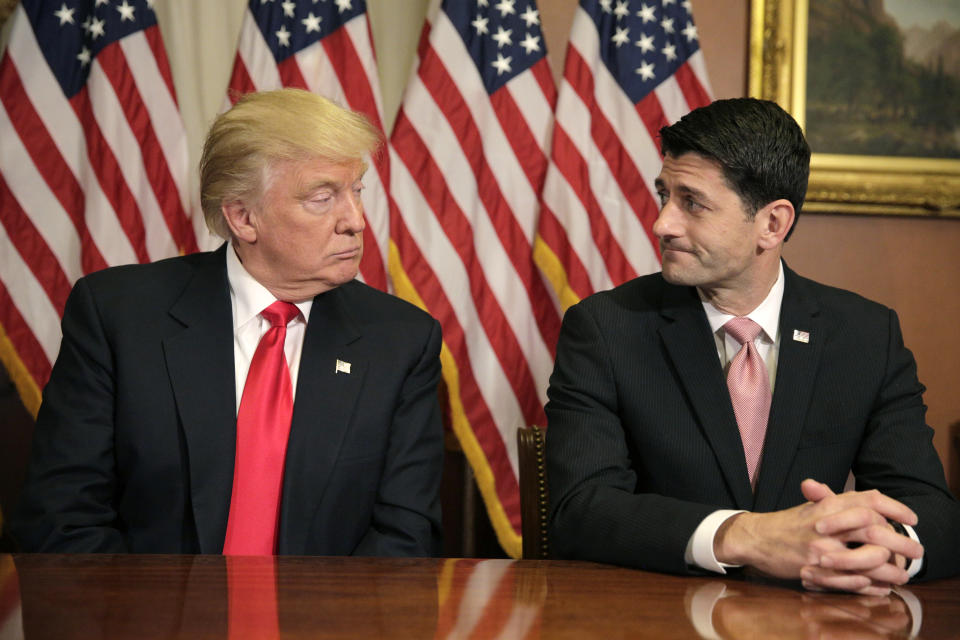Paul Ryan’s legacy looks a lot like Donald Trump’s
When Speaker Paul Ryan announced Wednesday that he would not seek reelection this fall, some on both the left and the anti-Trump right expressed hope that Ryan would now be free to stand up against President Trump.
“With his newfound political freedom,” said Senate Minority Leader Chuck Schumer in a statement, “I hope the Speaker uses his remaining time in Congress to break free from the hard-right factions of his caucus that have kept Congress from getting real things done.”
Ana Navarro, a Republican CNN contributor who has spoken out against President Trump, had a similar reaction: “Paul Ryan has 8 months as Speaker,” wrote Navarro on Twitter. “He’s finally free of political chains. Time to put country over Party. He should remove Nunes from Intel Committee, have a vote on Dream Act, move legislation to protect Mueller, and denounce Trump’s unpresidential actions & words at every turn.”

These comments echo those from many during the 2016 campaign, when Ryan was billed as a “white knight” who could potentially step in and wrest the nomination away from Trump. Instead, Ryan endorsed Trump in June 2016, stating that he felt “confident he would help us turn the ideas in this agenda into laws to help improve people’s lives.” Efforts by the media to discern daylight between the speaker and the Republican nominee on policy went nowhere. The Washington Post declared Trump’s tax plan “Paul Ryan on steroids.”
There is a widespread belief in Washington, unsupported by any evidence, that Ryan, with his measured demeanor and reputation as a deep thinker on policy, is a closet never-Trumper. The speaker has occasionally denounced Trump’s more racist statements, but according to 538’s voting tracker, Ryan has voted with the president 100 percent of the time. Ryan has repeatedly dodged questions about Trump’s tweets and urged others to ignore them.
Ryan has worked in Washington since graduating from college in 1992, and during that time he has built a reputation that seldom aligns with his actions, or even his stated beliefs. His ideological lodestar is Objectivism, a philosophy of radical individualism promulgated by the 20th century writer Ayn Rand, and his main policy agenda has been cutting income taxes, especially on the rich. Ryan has said that he makes his interns read Rand’s novel “Atlas Shrugged,” and told a group dedicated to the author that she’s the reason he got involved in public service.
Ryan’s greatest feat was selling himself as a deficit hawk while continually supporting measures that would cost the federal government money. He was elevated by policy groups and political pundits as a foil to Obama, who adopted the Wisconsin congressman’s claims that the Democratic administration’s additions to the deficit were simply untenable. This did not stop Ryan for voting for deficit expanding programs put forth by President George W. Bush, including tax cuts and Medicare Part D, which analysts have cited as adding hundreds of billions to the deficit.
Studies found that Ryan’s proposed budgets would add trillions to the deficit. During his 2012 vice presidential run, one focus group didn’t believe Ryan’s proposed budget — eliminating Medicare while cutting taxes for the wealthy — was real, simply refusing to “believe any politician would do such a thing.” Still, Ryan was lauded for his proposals, winning a 2010 award for his fiscal discipline from a budget watchdog group and earning Politico’s 2011 “Health Care Policymaker of the Year” honor for his plan to repeal Obamacare.

Ryan became speaker of the House in October 2015, succeeding John Boehner, and following Trump’s election he had the power to shape the Republican agenda along with the White House and Senate Majority Leader Mitch McConnell. Ryan supported a number of plans to roll back Obamacare and joined a celebration at the White House for the passage, by the House, of a proposal that would have slashed funding. Ryan was gleeful, telling reporters that he had been dreaming of cutting Medicaid funding since he was “drinking at a keg.”
Despite the Rose Garden celebration, the bill failed in the Senate, which left Ryan one major policy project to cement his legacy: tax cuts. He was successful in December as Congress passed the legislation and it was signed by Trump. Just before his announcement on Wednesday that he would retire at the end of his term, Ryan was greeted with a report from the nonpartisan Congressional Budget Office, which found that the plan would add more than a trillion dollars to the deficit over the next decade. That study that was dismissed by Republicans. But between the budget and tax cuts, Ryan’s final year in office will have been spent presiding over a ballooning of the same federal deficit he decried for years.
Ryan says he plans to serve out the remainder of his term, so he may have the opportunity to add to his legacy. Last October, following the mass shooting in Las Vegas, Ryan said he would “look into” the banning of bump stocks. There’s also the matter of the 800,000 “Dreamers” — undocumented immigrants who were brought into the country as children who were protected under the Deferred Action for Childhood Arrivals (DACA) program, which Trump ended. Last September, Ryan told those affected by the rescinding of DACA to “rest easy,” as Congress would take action to allow them to stay in the country. No such bill has passed Congress yet.
Ryan’s retirement may end up being good news for Republicans attempting to hold back a potential Democratic wave this November. A December poll found that 36 percent of respondents said an endorsement from Ryan would make them less likely to vote for a candidate, versus just 25 percent who said it would make them more likely. Democrat Conor Lamb used this tactic in his upset victory in last month’s special election in Pennsylvania, running on a platform of opposing Ryan’s attacks on government programs. A Democratic super-PAC took notice of Lamb’s messaging and released an ad in the wake of his win, targeting Ryan as someone who gave billions in tax breaks to Wall Street millionaires.

Read more from Yahoo News:



